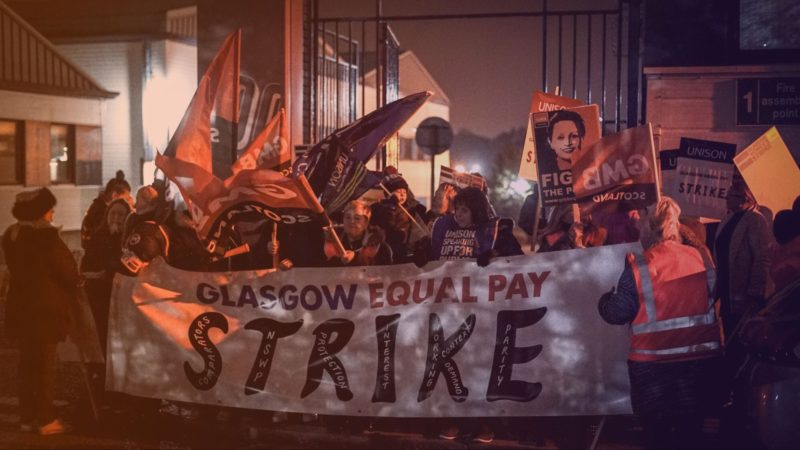
After this week, Glasgow Women’s Library will need a new display to reflect the truly historic action taken by 8,000 women in their battle for equal pay. Women employed by Glasgow City Council in predominately female dominated roles, such as care workers, cleaning and catering staff found their collective industrial voice and won a ballot for strike action.
The roots of the dispute started over a decade ago when, in an attempt to address gender pay inequality of the previous pay and grading system, the then Labour-led council introduced a Workforce Pay and Benefits Review (WPBR) Scheme. At the time neither UNISON or the GMB agreed to the scheme and walked away from the discussions due to significant concerns over the fairness of the scheme. Council managers and consultants pushed on and the WPBR scheme was imposed on staff in 2007.
From the outset, it was clear to women that the WPBR was unfair: roles such as care work and cleaning were paid up to £3 less per hour than male-dominated jobs. Bonuses were available for work beyond 37 hours per week. Under the WPBR, women-dominated roles were often part-time (some women held multiple part-time roles) and therefore they were unable to earn bonuses.
Whilst the women challenged the employer via trade disputes and tribunals, the employer dug in and appealed at every stage. Only in August 2017 when the Court of Session agreed with the women and found the WPBR discriminatory did Glasgow City Council announce that it would not appeal. By then the City Chamber was under the minority control of the Scottish National Party, who won the local government election in 2017 on a promise to resolve the rampant discrimination faced by so many low-paid women in Glasgow.
This must surely be one of the most shameful chapters in our party’s history. Labour, the party of equality, which enacted the Equal Pay Act, actively frustrated the efforts of the women of Glasgow to receive equal pay for work of equal value. Labour, the political wing of the trade union movement, acted to ignore the voice of organised labour and created a decade of deep injustice. We must never be on the wrong side of this argument again.
Since the local government election in 2017, Glasgow’s care workers and cleaners hoped that the new SNP administration would make good on their promise to resolve the situation. Unions and Action4Equality (who represent some of the claimants) have met with the Council over 20 times in the last year but are clear that no genuine progress has been made on implementing a replacement scheme or agreeing the value of claims for each of the 8000 women.
Having met some of the women involved it is obvious that they simply had enough and demanded action. In an unprecedented show of co-operation, both UNISON and GMB balloted members across the city and returned thumping results (99 per cent and 98 per cent) in favour of strike action. When notice of the 48hour stoppage was served on GCC at the start of October, the administration cancelled all planned talks with the unions. Instead of trying to meet to avert strike action the employer shut down the very mechanism which is usually used to avoid stoppages: dialogue.
The Council Leader, Susan Aitken, has not come out of this dispute well. She appeared to think it was better to talk to journalists than the unions or any of the women themselves, saying she was, “not entirely sure the women know the basis on which they are striking”. On the first day of industrial action Ms Aitken claimed the basis for the strike was not “strong enough”. These patronising and sexist comments are symptomatic of the way the women we entrust to do some of the most vital jobs in our city are demeane. It also shows an administration that does not understand trade unions. It is the workers who have led this action; good luck to anyone who tries to tell one of these Glasgow woman otherwise.
Scottish Labour leader Richard Leonard apologised earlier this year for our part in this scandal. This was a courageous move. We must do everything we can to help the women achieve justice and work on rebuilding trust in Labour across Glasgow.
Leah Franchetti is vice-chair of the Shettleston Labour Party and on the steering group of the Scottish Labour Women’s Movement.




More from LabourList
Majority of Labour members oppose government’s anti-migration measures
‘First past the post is corroding trust in politics. The government must make all elections fit for the future’
‘Hope starts young: Why Labour must tell the story of a better tomorrow’